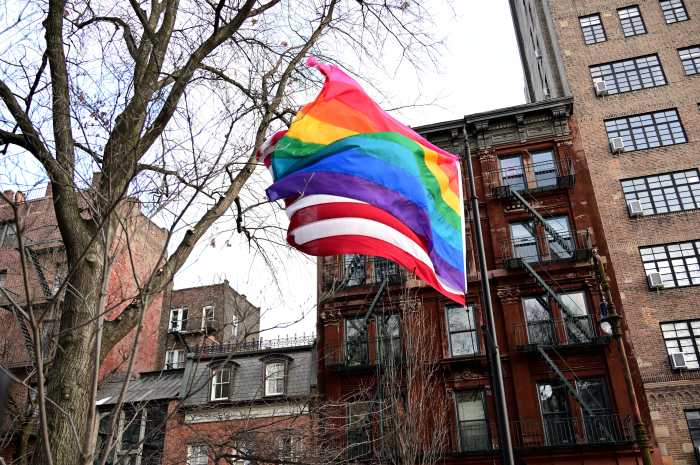At a press conference outside the Stonewall Inn on Friday, elected officials, attorneys, and immigrant and LGBTQ advocates gathered to demand the immediate release of Andry Hernández Romero, a gay Venezuelan asylum seeker who was deported by the Trump administration to a notorious prison in El Salvador, despite having no criminal record.
Supporters and passersby huddled to hear an update from Hernández Romero’s legal team, which claimed they have not been able to contact him since his detention in Texas, when he thought he would be returned to Venezuela.
“It is really, really astonishing to think that, for 55 days, an asylum seeker that had a case pending in US Immigration Court has literally been disappeared,” said Margaret Cargioli, directing attorney of policy and advocacy at Immigrant Defenders Law Center and counsel for Hernández Romero.
Hernández Romero, a 31-year-old makeup artist, fled Venezuela after facing persecution for his LGBTQ identity and political beliefs. Hernández Romero had an ongoing asylum case and had already established “credible fear” during his first interview with federal officials. He was set to appear in court when he was unexpectedly detained by ICE officials and deported to El Salvador based on allegations that his crown tattoos indicated he was part of the Tren de Aragua gang — claims his family and legal team have refuted.
“As immigration lawyers, we are fighting to keep his case alive in US immigration court,” Cargioli said. “Because he was denied due process and has a right to seek asylum in the United States.”
Hernández Romero is one of over 200 men deported to CECOT — the Salvadoran supermax prison also known as the Terrorism Confinement Center — under a rarely invoked wartime law, the 1798 Alien Enemies Act, as part of the Trump administration’s crackdown on immigration. A 60 Minutes investigation could not find any criminal records for 75% of the men deported. Most of those who did have criminal records, they reported, were for non-violent offenses such as theft, shoplifting and trespassing, with only about a dozen accused of serious crimes.
Dan Galindo, an attorney at the ACLU and counsel for Hernández Romero’s case, discussed two legal battles being brought by the ACLU against the Trump administration. The first challenges the administration’s use of the Alien Enemies Act, while the second, Galindo explained, calls for the return of Hernández Romero and others from confinement in El Salvador.
“In all the cases, the basic argument is the same,” said Galindo. “The president does not have the power to declare an invasion, to use a wartime power in peace, and to use a power that has never before been used in this manner in this country’s history.”
Many politicians and immigration advocates are concerned about the law’s invocation during peacetime, and its implications for due process.
“The fact that our country is sending individuals who have a right to be in the US due to their seeking asylum is really one of the grimmest and most outrageous scenarios I think any of us could imagine,” out gay State Senator Brad Hoylman-Sigal of Manhattan told Gay City News. “It could be any one of us, if you think about it. And that’s, I think, what’s so startling, is that we have to act mindfully that due process isn’t just for us, it’s for everyone. And when it’s chipped away and undermined through actions like has occurred to Andry — who’s next?”
In March, the accidental deportation of Kilmar Abrégo Gargia to CECOT due to an administrative error drew widespread attention. The Supreme Court has since ruled that, while the administration may use the Alien Enemies Act to deport Venezuelan migrants accused of gang affiliation, it is still required to follow due process by giving them their time in court.
Faced with this latest hurdle, on May 9, White House deputy chief of staff Stephen Miller announced that the administration was considering suspending habeas corpus — the constitutional right of any individual to challenge their detention in court. The suspension of habeas corpus is only permitted under the constitution in times of rebellion or invasion, but if successful, would theoretically enable the government to bypass immigrants’ right to challenge their detention in court before being deported.
Immigration advocates and politicians at the press conference also criticized the deportations for their lack of transparency.
“The government acted as a kidnapper,” said Congressmember Jerrold Nadler of Manhattan. “There’s no other way of putting it. The United States Government kidnapped this man, and sent him to a gulag in El Salvador.”
CECOT, where Hernández Romero is being held, has raised alarm among human rights groups and is infamous for its extreme conditions, overcrowding, and lack of visitation rights.
“One of the greatest forms of torture that CECOT imposes is to cut people off from their loved ones — no visits, no contact, and no communication,” said Cargioli. “Andry has not been heard of for 55 days — not by his attorney, family or friends.”
Cargioli explained that the Department of Homeland Security has rejected their request to allow Hernández Romero to attend his court hearing virtually — something she said is a widespread practice in the US — and has provided no information or assistance in contacting him.
“We asked the Department of Homeland Security to connect us or provide information as to how to connect,” Cargioli said. “They told us that they will not provide any information as to communicating with our client.”
She also called attention to the Department of Homeland Security’s recent motion to dismiss Hernández Romero’s asylum case in his absence. She said they are expecting to receive a decision on March 30.
Other speakers at the conference emphasized that the issue of due process in Hernández Romero’s case intersected with broader concerns for marginalized groups, as well as attacks on free speech and sanctuary cities like New York.
“No one’s saying if you committed a crime, you should not be held accountable,” out gay Assemblymember Tony Simone said. “But they’ve all of a sudden expanded the definition of what a crime is. If you disagree with them, it’s a crime. If you protest against a war you do not agree with, it’s a crime.”
Speakers stressed the importance of two pieces of upcoming state legislation in securing protections for immigrants: the New York for All Act, which would prohibit state and local agencies in New York from colluding with ICE; and the Access to Representation Act, which would provide funds for and establish the right to legal counsel for non-citizens in immigration court proceedings.
“Despite the actions of the federal government, we are here today to call on New York City to remain that beacon of hope for those seeking a better life, and to always remain a safe place for the LGBTQ community,” Hoylman-Sigal said.
As the final speaker at the event, Vladimir Tlali of the New York Immigration Coalition highlighted the stakes of this case.
“Our fight is not just for legal protection,” he said. “It’s for the right to live freely, to love freely, to live without fear. Our community is here, united today. And let this rally be a declaration: We will not be divided. Together, we’ll make sure that every immigrant and asylum seeker, every LGBTQ person, and every person of color knows that they have a home here in New York City.”





































